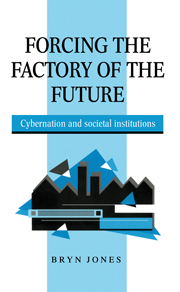Book contents
- Frontmatter
- Contents
- List of figures
- List of tables
- Acknowledgements
- List of acronyms and abbreviations
- Part I The workshop versus the factory
- Part II Technologies of control
- Overview
- 4 Technological evolution and the pathology of batch production
- 5 Numerical control, work organisation and societal institutions
- Part III Cybernation and flexibility
- Appendix: sources and methods
- Notes
- Bibliography
- Index
Overview
from Part II - Technologies of control
Published online by Cambridge University Press: 06 July 2010
- Frontmatter
- Contents
- List of figures
- List of tables
- Acknowledgements
- List of acronyms and abbreviations
- Part I The workshop versus the factory
- Part II Technologies of control
- Overview
- 4 Technological evolution and the pathology of batch production
- 5 Numerical control, work organisation and societal institutions
- Part III Cybernation and flexibility
- Appendix: sources and methods
- Notes
- Bibliography
- Index
Summary
As chapter 1 explained, the analyst of industrial change has to avoid lapsing into either technological or socio-economic determinism. Over-emphasising one of these aspects means overlooking the special contributions that the other makes to actual developments. Moreover, the technological and the socio-economic spheres may interact in highly specific ways to influence the operation of the factory. These interacting forces include: intrinsic changes in technologies, which may be amplified or subdued by the sellers, the users or government policies; the micro-economic calculations of participants and the macro-economic conditions of an industry or country; the socio-political institutions – such as the organisation of employer and labour interests and collective bargaining systems; plus institutional and cultural forces, crystallising in managers' production paradigms. Such forces have their own trajectories, or histories which interact in complex, variable and often unpredictable ways, with sectoral, regional or national variations.
The remaining chapters examine the trends towards computer integrated production systems, what has become known as Computer Integrated Manufacturing (CIM) by pundits and commentators. As part of the increasing micro-electronic automation that is becoming such a central feature in larger factories it is tempting to regard CIM as some necessary logic of technology; or at least as a combination of technological and economic rationality. The aim of the next two chapters, 4 and 5, is to supersede such deterministic views by showing that the early evolution and adoption of computerised production control took specific forms, for specific purposes; and because of some very special conditions.
- Type
- Chapter
- Information
- Forcing the Factory of the FutureCybernation and Societal Institutions, pp. 77 - 79Publisher: Cambridge University PressPrint publication year: 1997



